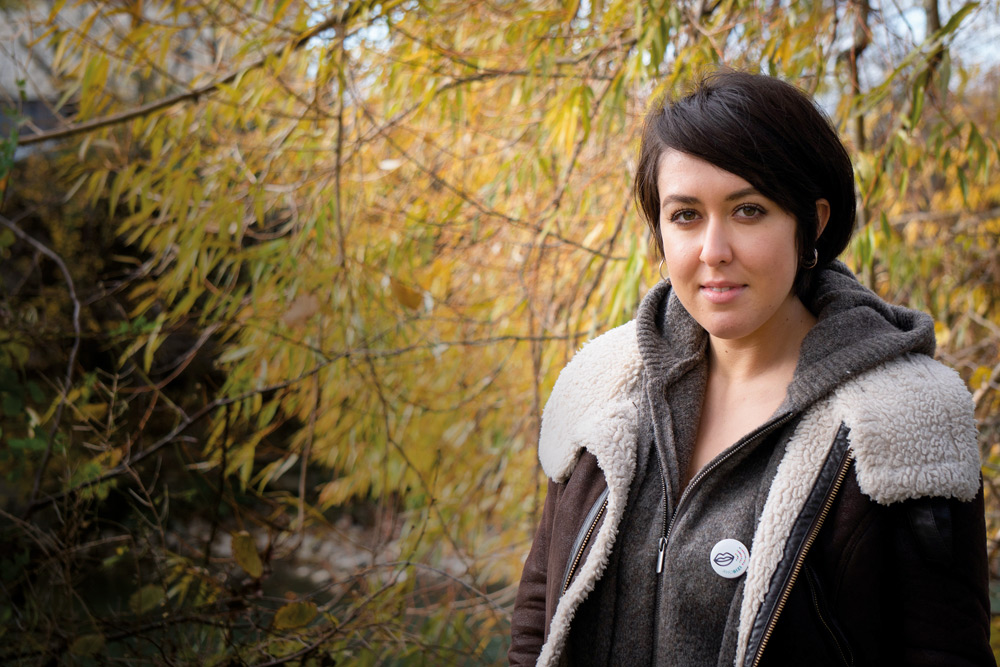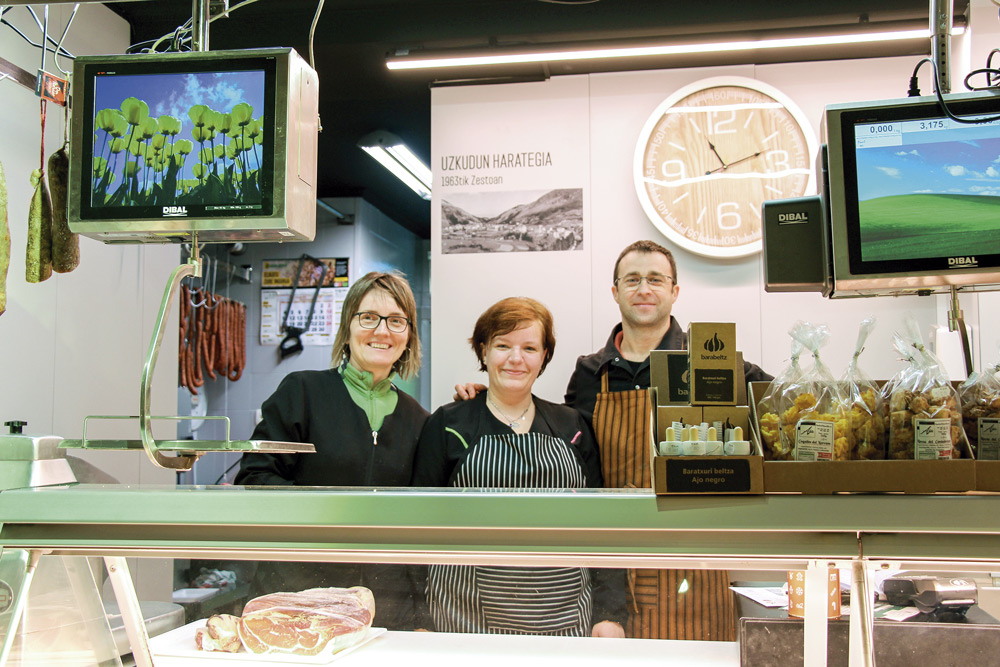"Learning Basque, Basque foreigners have a special place in Basque society"
- Dylan Denny-Stearn Inglis was born in 1998 in the English province of Devon. Two years ago, when he studied humanities at the University of Durham, he took a sabbatical year to study Basque in the Basque Country. In December last year he earned the title of EGA. Learn five languages: English, Mandarin, Spanish, French and Basque. He speaks Swedish and Biscayan. He returned to England in January. He replied in writing from Durham. Not only did he speak frankly, but he wrote perfectly.

You've created a huge flutter between the Basques. In the Basque media you have spoken correctly and correctly in Basque. Since when do you know Euskal Herria?
In 2016, mother, father, brother and I went on vacation to the Basque Country for the first time. My biggest hobby was studying French. Before I arrived, I had news from the Basque Country. When I drove to Heleta, I watched on the internet some simple Basque phrases. We entered a square bar, where our punched tips and our white and white complexion had denounced our British status. However, with total determination, I approached the inn’s crew and, with a French pronunciation, I gave them the “good afternoon” read recently. To my surprise, they answered me “good afternoon.” I still remember that huge feeling. I told my parents that what had happened at the time was the best thing that had ever happened to me.
In one and a half years you have learned Euskera, also Sulatino and Biscayan.
It motivates me to learn languages more and more deeply. Although I have learned the batua, from the very beginning I knew the importance of the dialect. Before going to the barnetegi, I contacted the course “Herritaratzen” that Radio Kultura taught in the year 2000, aimed at the Castellanospeakers of Iparralde. A number of languages, which have the same meaning, are often repeated, and the region of words is indicated. Zuberoa was often spoken of: The words “jin” and “etorri” I learned the same day. Before going to the southern barnetegi (Zornotza), I had become a Nordic!
On the other hand, my first interlocutor was Iñaki Zubiri of Baztan. We speak on the internet. He pointed out to me that some of the words I used, “tell”, for example, were not said elsewhere in the South. He, as a Navarro, had a special language; I learned “please” as a translation of the please. More or less was “little more or less”, and he said that Basque was not Basque, but at hand! I also love Baztan a lot and I know him quite well.
And the Biscayan ...
I've also learned Biscayan. I often write to a boarding school teacher, he is a proud Biscayan healthy. He told me that I could learn Biscayan from time to time. On the other hand, last year's Christmas, I started reading Harry Potter in Euskera, and did I guess what word Hagrid put? It is the Biscayan, the Biscayan batua! It gave me a lot of laughter. I had an English accent from westcountry (from my province). I barely understood the words of the Basque Hagrid, and I could not go on without understanding them, so I got to study.
Why study dialects?
One of the main reasons for learning the dialects is to comb the richness of my batua. In September, when I was preparing for EGA in the Basque Country Bilbo Zaharra, I tried to use the dictionary and grammar of a dialect in every work I did. In an informal letter I used the Biscayan verbs, labortan, baztans and zuberera and the Hitan of my friend of Baztan. The professor told me that nobody had written in Hitano in a play! Naturally, every language has many rarezas.Por examples, French and Spanish have many records, and each has a very varied literary area. The traditional characters of Mandarin Chinese have also fascinated me, but those vast languages of the world have something “ments” or “little”, which the Basque country apparently has.
What have you found in Basque, which you haven't found in other languages?
Very expressive structures. Maybe it would look pretty freaky, but that's very typical of Euskera. The Hitman is terrible, he's the only one in the world, apparently. Build a strong closeness with the interlocutor.
The Basque Country is very united in its land and I have learned taking into account the characteristics of the places of the Basque Country.
Euskera is the language that has fascinated you most. Why?
I love all the languages I know. But, above all, the reasons for loving Euskera are very varied; the language that was very recently a foreign article, has become very familiar to me. On the other hand, the Basque Country is very united to its territory, and I have learned it taking into account the characteristics of the places of the Basque Country: In Baztan, Arratia, Bilbao, Mutriku, Atharratze, in the classroom and in the classroom of teachers: the beauty of the verbs of each place has caught me, like nothing else. I also very much like the concept of “Basque”. I remember the day my professor talked about being Euskaldun, he realized that this language does not behave according to other larger languages; that is, once learned, Basque foreigners have a special place in Basque society. The link built is not just a language, I regard it as a consequence of the close relationship that Basque culture has maintained with language for thousands of years.
Some say that learning Basque is difficult.
What do you mean when you say “difficult”? That “difficulty” fascinated me, more and more. I don't know how many people have told me that learning Spanish or French is easier than learning Basque. Many people, of all ages, have told me that learning Basque and Mandarin is difficult. Among those who say that Spanish and French are easy, how many are able to speak in one of these languages? Nobody. How many of those who talk about the difficulty of Euskera and Mandarin speak in Basque or in Mandarin? As many as the previous ones! It is a great distance from the “easy” to the “difficult”, and when people say “easily” they describe it as “instructive” and the “difficult” is “inaccessible”. But that is not the case! If French and Spanish were so easy, all the friends that we showed a little interest in language would be full speakers.
What would you say to those who want to learn Basque?
That if you're in class, it's hard to learn everything. The Basque country must also be practised abroad. Not only is it effective, but the most pleasant part. On the other hand, every time I read a writing (a book sheet, an article, a poster...), I underline all the words, expressions, phrases, phrases and structures that I do not understand and which I point to somewhere. Then I learned them by heart. For example, in the barnetegi, I pointed out a lot of things that I wasn't going to use in the readings that I did in the classes of the day, and then, when I got out of class, I would put those words into the Anki mobile app, and if I had time, I would check them out. That gave me a great dictionary. Without the dictionary it is impossible to speak or write well, even without writing much. Studying vocabulary and grammar on my own, I have made much more progress. For the rest, make a space for the Basque in your life. Above all, read the things you like, but in Basque! As far as I know, almost everything that is in Spanish is also in Basque. I consider it a great step to be able to read in Basque for pleasure.
What do you have to say about Sulatino?
Zuberera seems very lost in the Basque Country batua, and I largely understand, as the province is very small: Ondarroa has as many Euskaldunes as Zuberoa. If the zuber has a pint of jewelry. The accent, for example. It doesn't come from French, although some might think so, but from the Belarusian language. The rhythm of the tongue is also impressive, very special compared to the rest of the dialects, and as beautiful as the rhythm of others. They also have vocabulary, they have words of the greatest. He has taken many words from Biarnes, for example, ments (lack) and sordeis (worse).
He is studying Basque. What exactly?
I will present the report at the conference on Languages and Society in Durham. For my project the project is as follows: Current linguistic dynamics of the Zuberoa and Arratia valley in Bizkaia. Zuberoa and Arratia are at the ends of Euskal Herria, and they have a very interesting original language. They are far from the Basque Country batua, and as a consequence, I have classified batua as a new “communicative variant”, since in their societies dialects and batua have different places. I have also looked at the weight of Spanish, how and why the linguistic situation in general has changed and how it will change in the future.
He has studied sunset in particular. What is the peculiarity?
The verb is immense! The words “dostasu”, “dosku” and “eustan” have fascinated me. The Basque Country in the West has many its own verbals. In addition, it changes a lot from one place to another. The other time I had a dinner with my friends from Igorre, Ondarroa and Mungia, they all spoke in Biscayan, but many times I realized the peculiarities of each one's language. Igorre’s said “geitu” to say “call”; the ondarrutarra and the mungiarra use “belu” to say “afternoon”, and the ontarrutarra, instead of saying “like”, said “gasta gustaten”. Well, when I speak in Bizkaino, I have to choose between saying “today” or “geur”, “dinner” or “dinner”, depending on what is in front.
My father and mother always ask me what I am doing, which party of the Basque Country I am exploring, both are very ‘belarriprest’
He has returned to England, how does Euskera retain?
On the one hand, thank you to my first Basque friend, Iñaki! I've been to his Edinburgh home twice. I'm also in touch with some friends. To maintain the Basque country, online conversations are urgent, as in Durham there is no one to talk to. Fortunately, in summer I contacted Mintzanet, and since then I have been talking to coordinator Ainara every week. Ainara and I are talking about Hitan, about sum, and that's a challenge. I have been given other opportunities and I have just started talking about residents of the senior residence in Busturialdea, that is also every week. As I traveled through China, I wrote my daily thoughts and experiences in Euskera. That came in a good way to give a concrete value to euskera.Me I speak in Basque to myself, and I am at my parents' house also to my cat (hikaz, little! ). I also read the atlas of popular language produced by Euskaltzaindia. But, for example, there's a kind of "addiction." I can't get off my head once I've started reading. With the Basque and the maps gathered… A real pleasure!
Therefore, the Internet is an essential tool for the Basque Country to remain alive.
It's the vital field I suppose. Fortunately, the content in Basque is very accessible. EiTB, a radio machine, news, light, local magazines, wikipedia, facebook, google. All in Basque. On Twitter, I don't usually walk a lot, but it seems that the Basque community that is there is very alive. It is a pity that mobiles have no Basque version. Mandarin, French, Spanish, English, all available. Why not Euskera?
What do your friends and family say about your experience in the Basque Country?
My father and my mother always ask me what I'm doing, which Basque party I'm exploring. Both are “belarriprest.” Friends are envious! Although Euskal Herria is not so far from England, Basque culture is totally unknown and inaccessible to them. However, they ask me and they find it interesting. In December, at an organized soccer team rally, we were given a role to each player, and my friends put me Olentzero.
What do you think about the Basque, beyond the language?
It's extraordinarily hospitable. I am surprised at the honesty of the Basques. In the villages of Shanghai, I've only found wonderful people, and outside, the Shanghai Basque Center gave me great help by the time I arrived. Whenever I'm in Mutriku, I go out to the pintxo-pot with a friend I met in the barnetegi, and now I know all his crew. They accepted me without thinking about it, they're very nice.














